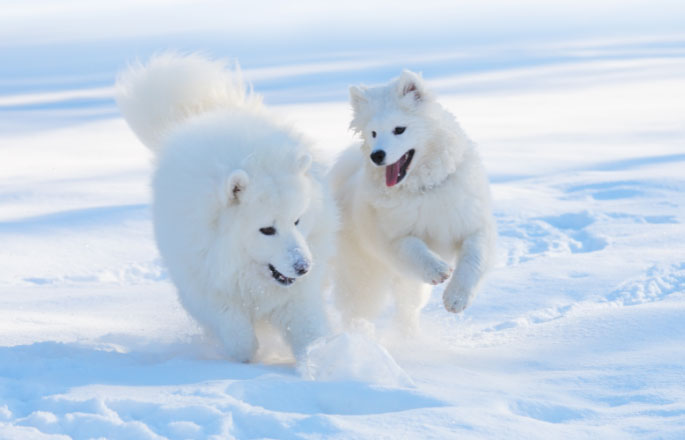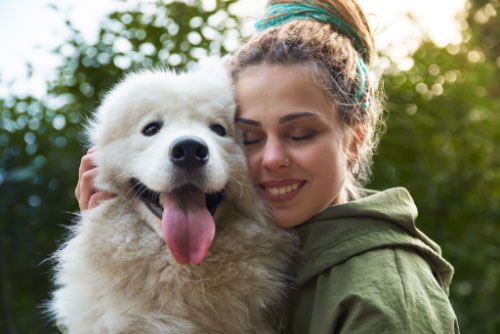
Samoyed is the forever jolly and smiling dog that could. Its snowy white coat and its upbeat personality make it one of the most loved dogs around. They love their human companions and are pretty intelligent.
The facts about the Samoyed will leave you pleasantly surprised.
Samoyed
Samoyeds come from an unyielding desolate land called Siberia. The harsh environments of their homeland make it one tough cookie to crack. The stamina it boasts can leave bystanders livid with awe.
Being similar to huskies, Samoyeds are sled dogs mostly. They have a crazy stamina level and a very thick fur to trap heat and warm themselves.
The temperatures in Siberia can reach below -60 to -65 degrees celsius. Nevertheless, these dogs learned to cope and thrive in such an environment.
Read More:
Samoyeds History
One thousand years ago, the Samoyedic people were somewhat of nomads of Asia. Drifting from place to place in search of permanent shelter from the elements and on the lookout for food.
Ending up in Siberia, these people needed companions who could survive the deadly environment. Their answer was breeding the Samoyed, obviously named after their people.
The Samoyed dogs were more than just companion dogs for these people. They were friends and trusted them with their lives. They had to cooperate mutually to ensure each other’s survival and thrive in the Siberian wilderness.
Samoyed dogs helped them hunt, gather food, and travel long distances. While the humans provided shelter and mutual warmth in the rabid cold land.
Samoyed Personality
Samoyeds are very loyal and devoted to their owners. They will warm their masters by being beside them in the cold and huddle together. They have a strong will but can be depressed easily.
Samoyeds get along with their family really well. They are gentle towards children and can differentiate which human can play rough. They are intelligent enough to obey small orders, as they have been sled dogs for centuries.

Due to their over-attached nature, Samoyeds can get separation anxiety easily. They get highly depressed without their owners. They choose destructive behavior to appease their sadness and depression.
Being from a hunter background, the Samoyed will have some natural tendency to hurt smaller animals. It is best to keep smaller pets and random small animals away from them.
Samoyeds Training and Exercise
Samoyeds are more accessible to train than many other hunter-based dogs. This is due to their extreme closeness to humans for eons. They still need to be taught from a very young age for the best results later on.
There is a concern about Samoids that they harm smaller animals than them. It is best to make them socialize from a very early age.
Positive reinforcement is the optimal method to teach them. Never attempt to punish dogs if they go wrong unless you want them to get negative thoughts about you later on.
Grooming Samoyeds
Grooming Samoyeds is quite a chore because they tend to shed a lot. Even going as far as shedding really heavily two to three times a week.
Their dense inner coats make a huge mess. It is necessary to brush every day with a thick pin brush to remove any mats or knots. Shampooing them once every month or so will do, as they can get their white coats really dirty.
Dogs like these tend to grow their nails faster. Due to the fact they lived in icy regions, they needed constantly growing nails. Clipping and trimming their nails once every three weeks is recommended.
Samoyed Health
Samoyeds are from a small line of dogs that possibly had to inbreed to ensure the survival of their lineage. There is a good possibility of dogs having genetic diseases from the get-go.
For example, Samoyed Glomerulopathy is a hereditary disease. It is a kidney disease for Samoyeds. Diabetes mellitus is also very common for these dogs, as well as cancer.
Samoyeds are affected by many common and hereditary diseases. These dogs are not healthy compared to an average dog standard.
It’s always best to take them immediately to a vet, for a thorough check-up as puppies.
Recommended Health Tests for Samoyed:
Ophthalmologist Evaluation
- Hip Evaluation
- PRA Optigen DNA Test
- Cardiac Exam
- RD/OSD DNA Test
It is always best to take them immediately to a vet for a thorough check-up as puppies.
To conclude
Samoyeds are amazing wonders of nature. I hope these facts gave you a delightful understanding of them.
Read more:



